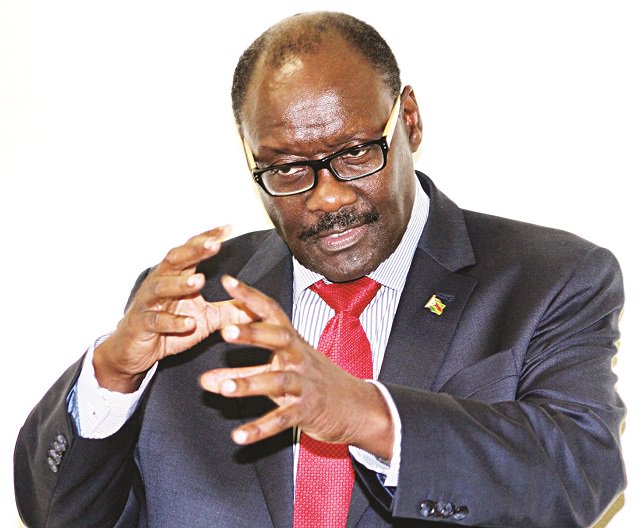By Byron Mutingwende
Health and child care minister, David Parirenyatwa, has said medicinal cannabis has potential value for alleviating some medical conditions. He made the remarks at the ongoing Zimbabwe Medical Association (ZiMA) 2018 Congress in Harare running under the theme: Professionalism and Medical Training.
The minister gave a brief update on issues of cannabis for medical use in Zimbabwe as it is outlined in the recently announced SI 62 of 2018.He said professionalism and training can make or break the medical profession if not given the attention they deserve.
In the line of their duties, medical practitioners were urged to uphold professionalism that encompasses accountability; competency; specialised knowledge; as well as quality and integrity.
“The issue of cannabis for medical use in Zimbabwe is outlined in the recently announced SI 62 of 2018. This was introduced in a professional way. However, many members of the medical profession did not seem to realise this as there seemed to be some knowledge gap on the process. Let me therefore take this opportunity to update you as requested. The Ministry of Health and Child Care (MoHCC) submitted correspondence to the Office of the President and Cabinet (OPC) requesting the Government to consider legalising cannabis for medicinal and scientific purposes following receipt of an application from a company in March 2015 to cultivate the plant. The OPC also received a Concept Paper from one of your own, a dentist with interest in the area, in March 2016 explaining the potential benefits of Industrial Hemp Industry in Zimbabwe.
“After extensive literature reviews by a multi-sectoral Technical Committee; it appeared medicinal cannabis had potential value for alleviating some medical conditions.Cabinet decided to legalise production of cannabis for medicinal and scientific purposes,” Parirenyatwa said.
Parirenyatwa said there is still need for further scientific research. There are three known uses for cannabis: medicinal, industrial and recreational. Zimbabwe has approved for now, the medicinal use and may later develop the industrial hemp with the recreational use remaining illegal.
There are three species of cannabis namely sativa sativa, with medicinal properties; indica (marijuana) which has psychoactive properties and ruderalis.
From reports from the International Narcotics Control Board, the major producers of medicinal cannabis over the years are UK, Canada and Israel. A cannabis extract containing dronabinol (delta-9-tetrahydrocannabinol) and cannabidiol is licensed as an adjunct treatment for moderate to severe spasticity associated with multiple sclerosis in patients who have not responded adequately to other skeletal muscle relaxants.
Also in these countries synthetic medicinal cannabis analogues such as nabilone are used for nausea and vomiting associated with chemotherapy where other medicines fail to give the required effect.
In Africa, only two countries, Lesotho and Zimbabwe have published regulations for the cultivation of medicinal cannabis. South Africa has issued guidelines for the cultivation of industrial hemp. Zimbabwe developed regulations in terms of the Dangerous Drugs Act [Chapter 15:02] and promulgated the Dangerous Drugs (Production of Cannabis for Medicinal and Scientific Use) Regulations, 2018 published in Statutory Instrument (SI) 62 on 27 April 2018. The SI 62 does not cover industrial hemp; whose requirements for cultivation and security are much easier.
Information gathered from literature and familiarisation visits to some cannabis growing countries, it has been established that research on medicinal uses for cannabis were initiated in the 1960’s and clinical trial results have demonstrated alleviation of skin, pancreatic and colon cancers, as well as asthma, epilepsy and parkinsonism. Benefits have also been noted as an appetite stimulant and managing anxiety.
The pharmaceutical formulations for development guided by formulation studies include suppositories; nasal sprays; tablets; oil capsules; edible cannabinoids as a nutritional supplement and topical creams. Parirenyatwa emphasised that smoking is not generally recommended for medicinal purposes.
On the Governance and Oversight arrangements for the implementation of the S I; a Steering Committee of Ministers with a corresponding supporting Cannabis Technical Committee of Officials was set up by President Mnangagwa made up of the Minister responsible for Health, Hon Dr P D Parirenyatwa as the Chairperson and Minister responsible Agriculture, Hon P Shiri, being the vice-Chairperson, with the other members being Ministers responsible for trade, finance, home affairs, and justice.
He said initially producer’s licences would be issued for pilots by government entities in partnership with the private sector, Public Private Partnerships (PPPs). Imperative requirements for the issue of a licence include adequate security; type and origin of seed; availability of technical expertise; identifiable off takers; compliance with International Drug Conventions; and proof of source of funding.
Zimbabwe has the potential to provide low cost and high yield medicinal cannabis due to favourable climate and appropriate soils. The plan is for Zimbabwe to become a hub and to develop into a world co-ordinator across all sectors for medicinal cannabis, with its own unique brand after value addition.
“The focus is the establishment of a Research Institute which will develop into a World Centre of Excellence focusing on agricultural products, traditional medicine, food technology, industrial applications in medicines and nutrition and protection of intellectual property rights. It is hoped that the Profession will develop an interest in this new area and conduct relevant research to contribute to the growing body of evidence of medicinal use for medicinal cannabis in order to provide effective alternative therapeutic solutions to the patients,” Parirenyatwa added.






